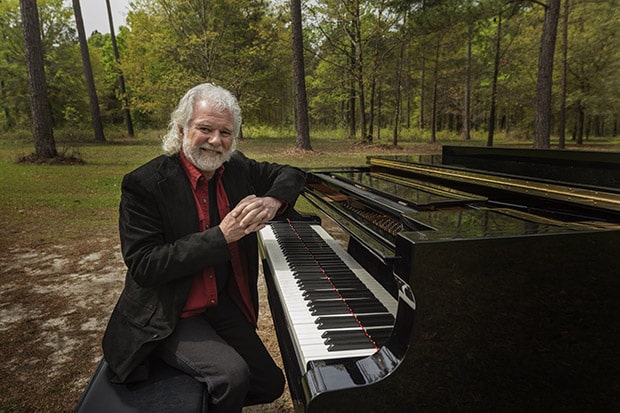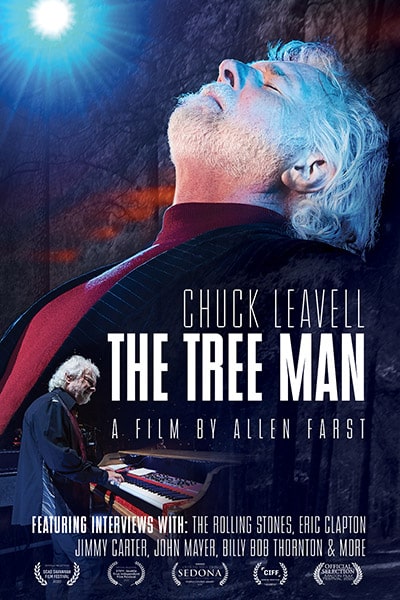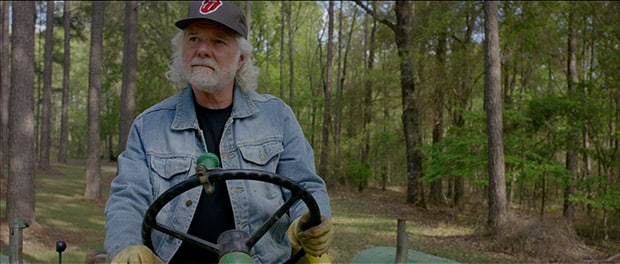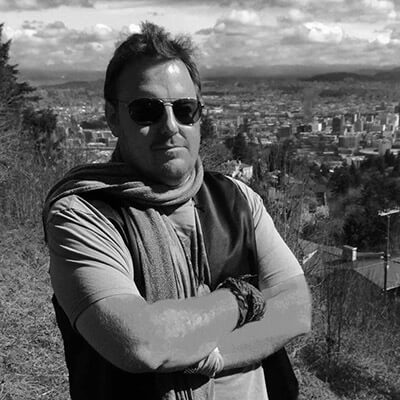
Chuck Leavell, the longtime keyboardist for The Allman Brothers Band, Rolling Stones, Eric Clapton and many more, has released a full-length documentary, “Chuck Leavell: The Tree Man,” available worldwide. The following is an interview between Jon Siembieda of Tahoe Onstage and Leavell discussing the movie, his career and his passion that’s led him to being honored as National Outstanding Tree Farmer Of The Year, as well as life in the COVID-19 era.
Jon Siembieda: During the pandemic, I’ve had the extra time to catch up on music documentaries and have combed through a lot. I have to say, your film is absolutely one of the very best I’ve seen.
Chuck Leavell: Well, thank you. We really had a good time doing it. It took three and a half years of work to get all of the footage together.
Jon: Out of all the documentaries with a star-studded cast of legit interviews, I’d say of recent times the three that blew me away with legend after legend going deep on the music would be yours, Jeff Beck’s, and Bobby Keys’. You guys got everybody to talk. That’s a testament to you.
Chuck: I was hoping maybe we’d get 50 percent to agree, and much to my surprise, it was a lot more than that.
Jon: The movie really has a cool concept, marrying three aspects of your life – obviously, the music, but also your marriage, and your life as an award-winning tree farmer. You really seem like you’ve made all of it work.
Chuck: I really appreciate that. When Allen (Farst, the filmmaker) and I initially got together, that was the theme. Three parts: My career in music, my environmental work and the love story. When we first discussed this project, he asked why I wanted to do this. My motivation was to have a document for future family members (such as) our grandchildren. I wanted something for the family to see, and to get a snapshot of the era of my work in music, from the Allmans (and before) to the present. There were a couple of folks I wish I could have gotten: Mac (Rebennack, aka Dr. John), but he was really, really ill when we were inquiring, and of course Gregg (Allman), but the same story – he was just too ill. But I’m very grateful for who we did get, and I really have to credit Allen. We had all this footage, and I said, “How the hell are you going to stitch this together?” But he did it over about six weeks, 8-10 hours a day. I have to give credit where credit is due. Allen did a fabulous job.

Jon: It really is terrific. I hope everybody out there that is interested in the film goes and checks it out. It appeals to a wide range. One of my colleagues (Tom Clarke) wanted to hear about Sea Level. (A jazz and rock group active from 1976-81). You had some underground legends such as Randall Bramblett in that band. What was it like working with him? Any plans for Sea Level to do anything else?
Chuck: Well, that’s very flattering. What a fan of Randall’s I am. I worked on his first solo record, and that’s when we really became friends. We first met in the band Cowboy. Then, we all got recruited to be involved with Gregg Allman’s first solo tour to promote his first solo album (1973’s “Laid Back”), and Randall was doing his first record at the same time. He asked me to play. So, we became really tight. After the first Sea Level record (which was a quartet), I felt the need to expand. We needed Randall’s songwriting, and he asked if Davis (Causey) could join, as he had been playing with Randall for a long time. Jimmy Nalls, the original guitar player, was into them joining. Randall and I remain friends to this day and (we) talk every month or two. He just released a record. Prolific writer.
Jon: Did you guys collaborate?
Chuck: Randall and Davis would collaborate, and they would bring in material that fit so great. He would really inspire me. I’ll never be the songwriter he is. My contribution was more on the instrumental side, a little bit on the vocals, and writing some instrumentals. That’s really my forté.
Would we ever play again? So many of the members are not with us anymore, like Jimmy and Lamar (Williams), and other bass players we’ve had. I feel it is better for me to do solo gigs and celebrate Sea Level by playing some of those songs during a show. Oftentimes, Randall will open for me, and then he’ll play with me during my set, so we still work together.
Jon: You were involved in a very interesting gig – The Brothers – right as COVID was about to come down. It was just about the last big concert on earth before the pandemic really hit. Everybody stepped up and played spectacularly. I have friends who flew back to see that gig. It’s very eerie how everything really escalated with the pandemic right after that.
Chuck: I know, man! By then, we were aware of COVID existing, and discussed about if we could even do this. We wanted to play. We checked with the current situation at the time, and we decided we could go forward. But you are right – it was eerie – literally the next day everything started to shut down. We feel so lucky we were able to play the show, and it was really fun. Warren was amazing. Reese Wynans also did a great job, and Duane Trucks on drums — channeling Butch — worked with Jaimoe really well. It was fun and so special on a personal level to celebrate that music again. The vibe going around after was, “Can we do this again? Can we keep this going?” And then, boom, COVID hit. That question is still dangling.
Jon: I think everybody would be ready for that when the time comes, or a weekend festival comprised of it. People would be extremely excited to see more. Warren was indeed incredible, shouldering a lot of the workload.

Chuck: I have a novel little story for you. Many ages ago, The Allman Brothers Band were playing Japan when Warren was with them. I think it was their first tour of Japan. Gregg got sick, came down with something and couldn’t sing that night. Dickey (Betts) was still in the band. Dickey said, “I guess we’ll have to cancel or figure something out” and Warren said, “I can cover Gregg.” Dickey said, “Do you really know all those lyrics?” Warren said, “I’m afraid I do!” And he went out and did it. Did you see that thing he did with Jerry Garcia and the orchestra? That just blew my socks off. Then he plays with bluegrass guys. He can do anything.
Jon: Indeed. I was front row with him playing with John Scofield in Las Vegas.
Chuck: Right! Scofield!
Jon: What have you been doing for the past year? Obviously, you probably have spent a lot of time working on your property. Has there been any music?
Chuck: We had to postpone the Stones tour. I miss those guys so much. We’re hoping something can happen when it becomes sensible. So, what can you do? Capricorn Studios has reopened. That’s been great. It has been like walking back in time going through those doors. So, I’ve been doing some remote sessions at Capricorn. The most recent I did was with Richard Ashcroft. I played on a Verve record many years ago, and his producer called me and said they’re doing this acoustic thing, could I contribute? And I said hell yes.
All of this has caused me to work our land more here though too. So that’s what I’ve been doing a lot. We’ve been able to acquire a nice track a few years ago. I’ve been looking at some management practices, prescribed burns. We actually have a traditional Southern quail hunting commercial business, seasonal from November to the first week of March. We have a nice 5,500-square-foot lodge, a restored smaller farmhouse that we use for overnight guests, a spectacular staff of people, fabulous Southern cooking, really great guides, jeeps, dogs, we’ve got all of it. It’s a big part of our lives here at Charlane (www.charlane.com). So that’s been the focus. Our bedrooms are set up for privacy, socially distanced. Fortunately, it’s been a great season for us.
With the documentary, we’ve been focusing on promotion as well during this time. It’s given me the opportunity to show the trailer and do some things remotely.
Jon: Being out in California, we have big problems with forest fires. You talk about prescribed burns in the movie. You also talk a little bit about the California wildfires. Two questions: Do you have any additional advice for us, and can we get you to help Gov. Gavin Newsom?
Chuck: Well, I feel so badly for those who have lost their homes and lives in the horrible wildfires. It has really escalated in the last decade. I have a fledging TV program on PBS called “America’s Forests” and we did an episode in California at the Paradise community and saw the damage of the Camp Fire. We met with a nice young man who lost everything, but he got out with his family and children. Amazingly enough, his message was to rebuild Paradise. So, we had a nice segment with him. Seeing that devastation really brought it home for me. It really strikes your heart. There were still burned-out vehicles on the side of the road and burned-out houses. This was also the time of the rolling blackouts, and there were only generators running a few stores in town.

What can you do? No. 1, it is very tragic, but it can also open everyone’s eyes that we need to address this. One other thing we covered in that segment was that Newsom and Cal Fire started to create wide edges on certain highways to clean out the underbrush so if a spark under a vehicle or a cigarette is thrown out the window, it would give Cal Fire enough time to respond instead of lighting everything up immediately. I believe it was 150-200 feet on the edge. I think that’s a great practice, I’d like to see California do more of that. I think you have to also get people comfortable with prescribed burns. They can absolutely reduce the incident to wildfire. It takes a lot of education with the community, people on television and through various methods about why it’s so important. The other thing I’d say is that it’s also like building on the edge of the ocean where hurricanes come. Let’s be careful where we build and have some strategy on protecting the community from wildfires. Finally, it is partially about the money, you need more personnel to handle it. I hope California policy increases its budget for this.
Jon: You have to have at least one good Bobby Keys story, right?
Chuck: (laughing) Oh my God, I love that guy so much. We would joke that we were Southern brothers working with the British Army. Bobby was brash, he was not afraid to speak his mind, which would get him in trouble from time to time. I can remember when Tim Ries came into the band on saxophone. Bobby called him and told him to come down to his room and listen to some music. Bobby has the damn stereo on 11. The phone rings. It’s the hotel, they said there’s some complaints. Bobby said he “ain’t turning it down, we’re paying for everything here in this hotel, you can’t tell me what to do!” Tim was trying to be cool, thinking maybe they could turn it down a little. The phone kept ringing, and finally Bobby, after numerous complaints, said to Tim, “Maybe you’d better leave, there’s fixin’ to be a situation here!”
Bobby was so good to me, partially because we’re both Southerners, so we could relate. Bobby loved football, I love football, so we’d sit there and watch NCAA games, pro ball as well. It was so sad when he got sick. It really hurt when he couldn’t be out there with us anymore.
Jon: I’m as big of a Rolling Stones fan as there is. There’s a lot out there, but I’m one of ‘em. Out of all the tours since 1982, what’s stood out? You also played with David Gilmour in Pompeii. You’ve played countless special shows and special places, what are a couple?
Chuck: Going back to the Allman Brothers Band, the Watkins Glen show (1973 Summer Jam) with The Band and Grateful Dead really surprised everybody. We felt like it would be a big deal, but the hope was maybe 100,000 at the most would attend; 80,000 would be incredible. The gates started falling down, there ended up like 600,000. That was certainly memorable. I have a few photographs from backstage talking about what kind of jam we could all play together at the end. I got a couple of shots with me and Jerry Garcia with our instruments. That’s very special.
Skipping to the Stones, when we went to Europe in 1990, we played a few former Soviet bloc countries. We had 126,000 people in Prague. There was an amazing vibe and feeling of freedom. It was almost a post-war environment. I’ll never forget that. The posters were brilliant: “Tanks roll out, Stones roll in!”
Skipping forward to Rio (de Janeiro, Brazil) documented in 2005 at Copacabana Beach. We were watching at the hotel on the beach with the crowd forming all day (a million people reportedly attended). It was amazing. We had a damned good show. Really enjoyed it. One more I’ll mention is 2016 when we played Havana (Cuba). Funny story about that was that everything was set with the date, plan, everything, and then Obama decides he’s gonna go the day before we were gonna play, so the authorities called and said we couldn’t handle both of those things, can you wait a week? We all agreed and waylaid in Miami for a week. It was a free show, 750,000 was the estimated attendance. Absolutely stunning. Our music was technically banned there, but they were mouthing the words to the songs. That was an amazing feeling.
Jon: I watched the Jimmy Carter film on CNN (“Jimmy Carter: Rock & Roll President”). That was obviously an interesting time for The Allman Brothers Band. Jimmy seems like such a genuine and interesting guy for a politician. You’ve been “there” for so many pivotal moments in music history.
Chuck: It’s been an incredible journey for me. I’m very grateful. The Stones feel strongly about breaking new ground, like doing something special and playing in former Soviet countries, China, Russia, Cuba, etc. I think Billy Joel was the first to Russia, but the Stones followed suit pretty quickly. They feel strongly about that. Not just to play, but to make a special memory for a lot of people. When I did the Gilmour tour — which was amazing — we put it together, and I looked at the venues. Pompeii, Circus Maximus, Roman Amphitheatre. I asked him, “David, you can play any stadium in Europe, the U.S., anywhere, why these venues?” He said, “I’ve had a great career, there’s a lot under my belt, I want to do things now that aren’t just a musical experience, but an environmental experience, where people are in a historic place enjoying the music.” He spends a lot of money to play those places, but I’m so glad he does.
Jon: He also takes care of his land.
Chuck: I think he tells the story in the movie. When he was young and went to a guidance counselor to discuss a career, they recommended forestry!
Jon: I always ask about gear. In the movie, there’s a great scene where you’re in Muscle Shoals, playing the piano that was on “Wild Horses” and all those classic Swampers tracks. What do you use nowadays? What cool gear have you played over the years?
Chuck: Back with the Allmans, I carried around a 9-foot concert Steinway Model D with me. Back in those days, a lot of piano players had two pickups being used, Carl Countryman and Helpinstill. I had the Countryman, there were five pickups on the harp of the piano, you could use different sized blades that were magnetic and could go close to the strings. That was early technology for rock and roll piano players. You have to fast forward. It’s all about technology now. Yamaha, Roland and other manufacturers make excellent reproductions of stage pianos. The Yamaha CP300 is an older model, current is CP88, which is also very good but takes time to load information — only thing that scares me – power outage. CP300 is a simpler unit but works great for the Stones and my live stuff. However, as far as software, the Ivory 2 is also worth mentioning. In general, you can load them in a computer and play virtual pianos, Bosendorfer, Steinway, Yamaha. I’m using it at Capricorn, because they don’t have a piano yet (we’re working on that). The software works great. The other advantage is recording MIDI files to send overdubs overseas or somewhere else. If you include MIDI, they can use that with their favorite software program. I love the technology man! I’m still an old-fashioned guy, though. I love the Wurlitzer, still use a real one with the Stones. I also love the Hammond B3 and A100, but I don’t really take it on tour. Too nice. Suzuki, which now owns Hammond, have amazing new instruments. The Hammond B3 is a big thing to carry around. It’s great to access those sounds very accurately without having to load the monster every night. Randall is all about the Nords. He’s very good with it. He can split the keyboard with organ on his left hand and piano on the right.
Jon: Have you been listening to anything good lately?
Chuck: Not so much rock and roll, at least not current stuff. I listen to Derek (Trucks) and Susan (Tedeschi), they’re carrying the mantel in my eyes. When I’m in the pickup truck riding around, it’s the classic rock station or Classic Vinyl on SiriusXM. I have to mention, what a tragedy to lose Chick Corea. I wore out an album with Gary Burton (“Crystal Silence”) many years ago. Keith Jarrett is huge for me, and it’s tragic he’s fighting the effects of a stroke. Flat out amazing genius. His legend will live on forever. My good friend Bruce Hornsby, too. Love him to death. He’s doing the instrument justice with his pursuits of so many different styles. I have great admiration for him.
Jon: Who have you not played with, but would like to?
Chuck: There’s some names out there, Van Morrison. Love Van’s work. Great songwriter, singer, genius.
Jon: The first documented mic drop in rock and roll history, when he left the stage during “The Last Waltz!”
Chuck: Yeah! I forgot about that! Let’s see. Sting. I’ve always liked his work. I did a one-off, backing him for a benefit gig in San Francisco. I’ve always really admired him. Bonnie Raitt, even thought she was in the movie and I’ve sat in with her, I’ve never worked on a record with her. There’s a few.
Jon: Last question – where can everyone watch your movie?
Amazon Prime has the most viewers. It’s available almost everywhere but Netflix — Apple Music, Apple TV+, Hulu. You can order it on Blu Ray or DVD through Walmart or Amazon. The website is http://www.chuckleavellthetreeman.com. My TV show can be watched at http://www.americasforestswithchuckleavell.com. Lastly, you can keep up with Chuck on his own website: www.chuckleavell.com.
— Jon Siembieda
“The Brothers” album review: What turned out to be the last major concert in America featured a band well-rehearsed and locked tightly by uncommon proficiency, conviction and elation.

